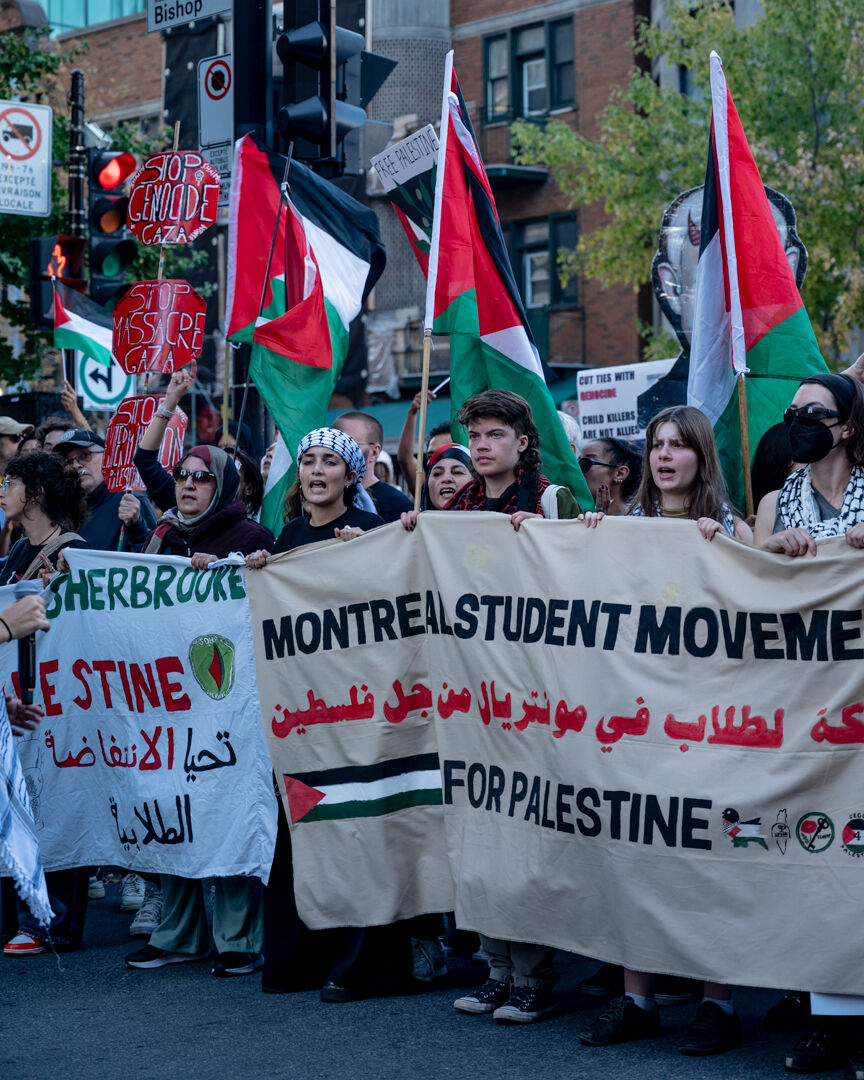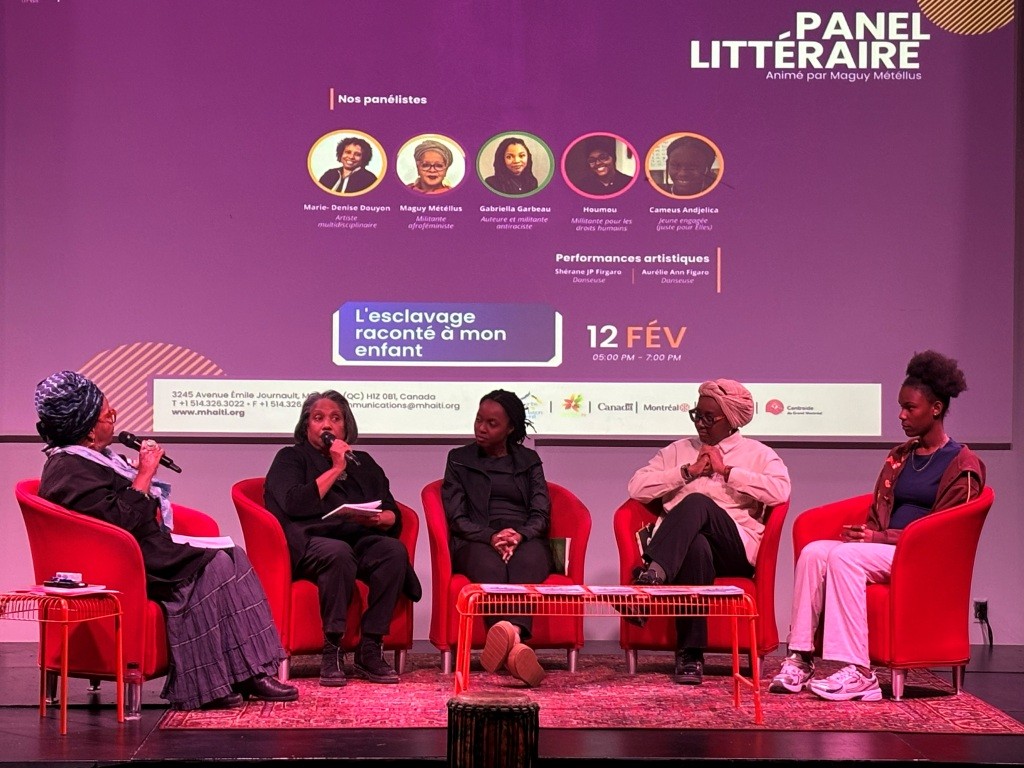On Tuesday, October 7, two years after the beginning of Israel’s genocide on Palestinians in Gaza, thousands of students from universities across Quebec walked out of their classes in solidarity with Palestine. They gathered in front of Concordia University’s Hall Building and marched all the way to McGill University, demanding divestment from their institutions.
Weeks earlier, Canadian Prime Minister Mark Carney officially recognized the state of Palestine. We took the time to speak with Palestinians in Quebec and learn about their thoughts on this development. Many see this recognition as a superficial gesture that is out of touch with the reality experienced by Gazans.
In his statement of recognition, Carney offered “partnership in building the promise of a peaceful future for both the state of Palestine and the state of Israel.” He also confirmed that the Palestinian Authority provided “direct commitments” to Canada on fulfilling its demands. Demands that many Palestinians find contradictory to the quintessence of recognition.
“This is not only a meaningless gesture, it’s actually deceitful”
Haya Alsakka, a Palestinian from Gaza and organizer with the Palestinian Youth Movement in Montreal, recalls feeling disappointed and frustrated when coming across the news of Canada’s recognition of Palestine. She points out that this recognition has no conditions for ending the genocide, lifting the siege on Gaza, or stopping the expansion of annexations in the West Bank and the illegal occupation of Palestinian territories.
“Realistically and especially in a time of genocide, this is not only a meaningless gesture, it’s actually deceitful. It’s intended to get eyes and attention away from the call for an arms embargo and soften the image that Canada has on the international stage,” Alsakka says.
She emphasizes that there has been a clear call over the past two years, for Canada to impose a two-way arms embargo on Israel and end its complicity in the ongoing genocide, which renders the recognition “a bad faith effort to suppress this call.”
Alsakka also remarks that pressure on the government is intensifying, as Canada’s involvement in Israel’s war crimes against Palestinians has been getting increasingly exposed over the last few months. She makes reference to a recent report released by the Palestinian Youth Movement, in collaboration with other organizations part of the Arms Embargo Now campaign, exposing Canada’s military exports to Israel.
The findings of this report reveal that Canada never stopped sending weapons to Israel, opposing the Canadian government’s denial of being implicated in the genocide. They used complementary methodologies to track arm exports and identified three trade channels, including direct commercial export from Canadian companies to Israel, indirect exports of Canadian arms to Israel shipped via the U.S and imports of Israeli military technology and hardware.
Global Affairs Canada had stated that no export permits for weapons that can be used in Gaza have been accepted since January 2024. Moreover, Canada’s Foreign Minister Melanie Jolie said that around 30 permits have been suspended since then. However, according to the report’s analysis, 47 shipments were sent out from Canadian manufacturers to Israeli manufacturers between October 2023 and July 2025, under previously approved permits.
The report leaks other significant information regarding Canada’s arms trade with Israel. That encompasses the Canadian companies and parts that are essential to maintaining Israel’s daily attacks on Gaza, the amount and types of military goods that are being shipped and the way they are being used against Palestinians, as well as other deductions based on the data they were able to retrive.
Alsakka believes that this research should be highlighted extensively and pursued further in order to ensure that the people continue to question the Canadian governments’ claims about its role in the perpetration of this genocide, as well as continue to apply pressure for an arms embargo.
“We have very concrete evidence that our government has enabled and facilitated the flow of weapons to the State of Israel and that Israel would not have been able to carry out this genocide without those weapons. We need to double down on this call [for arms embargo], double down on a call for an immediate ceasefire because Canada has the power to do so,” she adds.
“In the wake of this recognition, Gaza is still being bombed”
Nayrouz Abu Hatoum is a Palestinian associate professor in the sociology and anthropology department at Concordia University, whose research explores the question of statehood in relationship to the Palestinian struggle and struggle for liberation, specifically in the occupied West Bank. Like many other Palestinians she knows, Abu Hatoum is extremely skeptical of this announcement for many reasons.
She calls attention to Carney saying he wants a “Zionist Palestinian state,” during his interview with Micheal Forman, the president of the Council on Foreign Relations. “I found that to be really problematic to say the least, particularly because he’s asking an Eastern Mediterranean society to adopt a 19th century, Western European political national movement,” she says.

Abu Hatoum raises that Canada remains complicit in Israel’s genocide against Palestine, rendering its declaration a recognition of a state without people. “If Israel is not stopped, then you’re talking about debilitated state,” she says.
She does not believe this recognition will have any impact on Palestinians. “In the wake of this recognition, Gaza is still being bombed. There’s still attacks on the West Bank, they’re still being ethnically cleansed by settlers. So for Palestinians, they wake up to yet another day in which this recognition means nothing,” she states.
Abu Hatoum notes there are two analysis on Carney’s statement that are being spread. The first one is Canada is attempting to gain control over the pro-Palestine movement in the country and pretend they fulfilled the demands that are being voiced. The second one is the government is trying to wash their hands from the crimes they funded and supported.
She challenges another element that Carney reiterates in his statement, which is the demilitrization of the Palestinian state. She stresses that while Palestinians are being deprived of military protection, there is also no guarantee that Israel will not bomb them.
Abu Hatoum cites Lebanon as another example of a country that Western nations want demilitarized. “Supposedly, there is a ceasefire. Only yesterday, a family of five was killed, including two children. You want to demilitarize Palestine and Lebanon but there is no protection,” she explains.
With this recognition, Abu Hatoum sees a possibility of another round of negotiations after the failure of the Oslo Accord in 1993, which she thinks will give Israel time and let it buy time to continue ethnically cleansing Palestinians. “By endorsing Palestinian statehood within this model, Western governments simultaneously validate Israel's right to exist and expand,” she says.
Abu Hatoum maintains that if the Canadian government abides by international law, then it should clarify that Israel can’t defend itself against the people it occupies. “They should have done everything in their capacity to stop the genocide. That’s something they didn’t do,” she concludes.
“You can’t put pressure on Palestine then let Israel do as it pleases”
Safiya Barakat is an active member of the Palestinian community in Quebec who teaches history and Arabic. She recounts experiencing mixed emotions after hearing the news of Carney’s recognition of Palestine. “It’s a right that was stolen from us years and years ago,” she says.
Nonetheless, Barakat suspects this recognition carries a hidden agenda, considering its conditional nature. “It’s illogical to demand the demilitarization of a state whose people are getting massacred and starved,” she asserts.
Barakat underlines the silence and inaction of the international community over the years, while Palestinians have been getting ethnically cleansed and forcibly displaced from their homes since 1948. “Didn’t the International Criminal Court issue an arrest warrant for Netanyahu? Why is he still on the loose?” she asks.
Echoing Abu Hatoum’s words, Barakat detects a potential repetition of the Oslo Accords. She calls out the hypocrisy of Canada’s conditions and the imbalance it creates. “You can’t put pressure on Palestine then let Israel do as it pleases,” she says.
She deems Carney’s statement as a manifestation of the pressure that has been put on the Canadian government over the past two years, but also a strategy aimed at silencing the vocal pro-Palestine community in the country, which has been consistently calling for a stop to the flow of weapons to Israel.
Barakat refuses to be satisfied with Canada’s recognition, if it’s not accompanied by sanctions on Israel and an arms embargo. “If this doesn’t happen, that means their intentions were fraudulent all along and they have other plans for Palestine,” she deduces.
“For me, there is no peace on stolen land. I have no faith in a two-state solution or any normalization. Recognizing [solely] Palestine is what would make me happy. It’s my country. It was stolen from us, but it will be free again. We will return. There is no other alternative,” she says.
What should happen next?
Lea Pelletier-Marcotte, policy analyst for Oxfam Quebec examines the implications of Carney’s recognition in regards to their humanitarian efforts.
She mentions this recognition is just the first step in a long list of actions that must be taken, in order to make significant changes on the ground. “This recognition should not be merely symbolic. Without meaningful efforts to achieve a ceasefire, end the occupation, lift the siege and stop the settlements in the West Bank, it’s meaningless,” she said.
Oxfam has been present in Palestine for over 50 years, responding to the humanitarian crisis created by Israel’s siege on Gaza and working with partner organizations on the ground, to provide health services to expecting mothers and young girls, as well as psychosocial support to displaced individuals.
“Because we have these projects in Palestine, we want to show Canada that, isn’t it disingenuous to help us, support and finance these projects, while fueling the humanitarian crisis, the genocide and the occupation by providing arms to the very people who occupy the land?” Pelletier-Marcotte asked.
Regardless, Oxfam’s mission does not exclude advocacy and applying pressure. “We work alongside [other organizations] to push [our] demands on the Canadian government so that it can act meaningfully and not just provide statements of concern,” she said.
In response to this recognition and the escalating violence against Gazans, Oxfam is calling on Canada to take accountability, end its arms trade, support international justice mechanisms and keep demanding for a ceasefire.
La Converse contacted Anita Anand, Canada’s Minister of Foreign Affairs, for her comments on this recognition and on Canada’s arms trade with Israel, but she had not responded to this request at the time of publication.




.jpg)


.jpg)